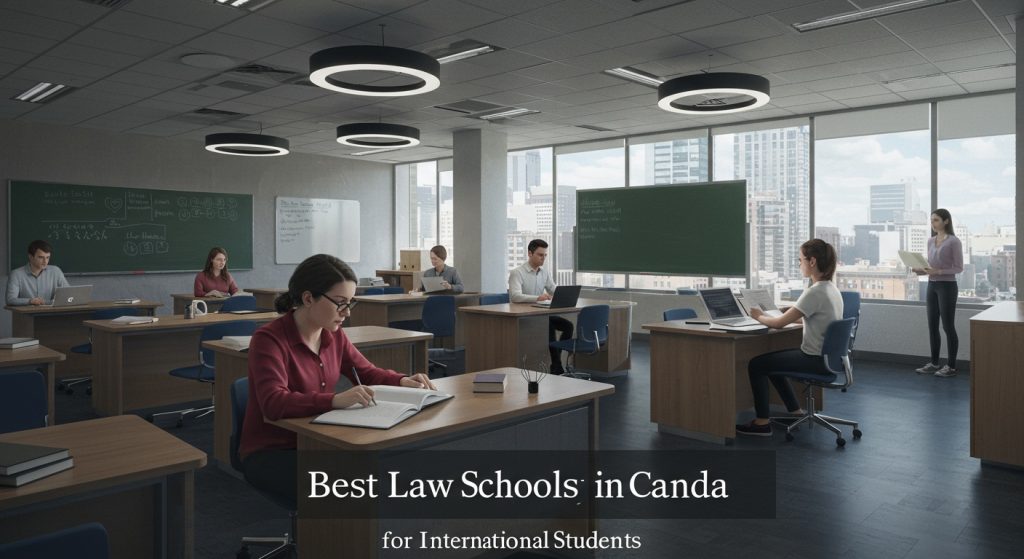Imagine landing in a new country, dreams of a legal career sparkling in your eyes, only to be met with a wall of unfamiliar academic systems and licensing requirements. That was me, years ago, fresh off the plane and completely overwhelmed. The promise of a Canadian law degree felt miles away.
It doesn’t have to be that way for you. Navigating the Canadian legal education landscape as an international student can be complex. With the right details, it’s absolutely achievable. We’ll explore the top law schools that not only offer exceptional legal education but also provide the support system international students need to thrive.
Think of this as your insider’s guide, drawing on both my personal experiences and the latest insights from legal professionals and academics. Together, we’ll uncover the best pathways to launch your legal career in Canada, no matter where you’re starting from.
Program Overview and Benefits
Choosing the right law school as an international student in Canada requires careful consideration. It’s not just about prestige; it’s about finding a program that aligns with your career goals, offers robust support for international students. Provides opportunities to network and build a career in Canada or abroad. This article aims to provide a practical guide to navigating this process.
Canadian law schools are known for their rigorous academic standards and focus on critical thinking and practical skills. They offer a diverse range of specializations, from corporate law to human rights law, allowing students to tailor their education to their interests. Moreover, many schools offer joint degree programs and exchange opportunities, broadening the educational experience.
One of the key benefits of studying law in Canada is the opportunity to learn about a unique legal system that blends common law and civil law traditions, particularly in Quebec. This exposure can be invaluable for international students seeking a global perspective on legal issues. Ultimately, the goal is to equip you with the knowledge and skills to thrive in a competitive legal landscape.
Key Features and Requirements
Understanding the key features of Canadian law programs and their specific requirements is crucial for a successful application. Most Canadian law schools offer a three-year Juris Doctor (JD) program, which is the standard entry-level degree for aspiring lawyers. Some schools also offer graduate programs like LLM (Master of Laws) and PhD programs for those seeking advanced studies.
Admission requirements typically include a bachelor’s degree from a recognized university and a strong LSAT (Law School Admission Test) score. But, some schools are increasingly considering GRE scores as an alternative to the LSAT. International students will also need to demonstrate English language proficiency through tests like IELTS or TOEFL. Be sure to check each school’s specific requirements, as they can vary.
Beyond academic qualifications, Canadian law schools look for well-rounded candidates with strong analytical skills, communication skills. A demonstrated commitment to social justice. Extracurricular activities, volunteer work. Relevant work experience can significantly strengthen your application. Think about how your unique background and experiences can contribute to the law school community.
Career Prospects and Outcomes
The career prospects for law graduates in Canada are generally positive. The legal job market can be competitive. Graduates can pursue careers in private practice, government, non-profit organizations. Academia. The specific career path often depends on the specialization chosen during law school.
Canadian law schools often have strong connections with law firms and other legal organizations, providing students with valuable networking and internship opportunities. Many schools also offer career services, including resume workshops, mock interviews. Job fairs, to help students prepare for the job search. It’s crucial to actively engage with these resources.
For international students, securing employment in Canada after graduation may require additional steps, such as obtaining a work permit or permanent residency. But, many Canadian law schools offer support and guidance to international students navigating the immigration process. Consider researching immigration pathways and seeking advice from immigration lawyers or consultants. You may also find opportunities to work in international law firms with offices in Canada.
Application Process and Tips
The application process for Canadian law schools can be rigorous, so it’s essential to start early and plan carefully. Most law schools use the Ontario Law School Application Service (OLSAS) or individual application portals. Be sure to familiarize yourself with the specific requirements and deadlines for each school you’re interested in.
A strong personal statement is crucial for showcasing your unique qualifications and motivations for studying law. Highlight your academic achievements, relevant experiences. Career aspirations. Be authentic, articulate. Demonstrate a clear understanding of the legal profession. Proofread your statement carefully to ensure it’s free of errors.
Letters of recommendation can also play a significant role in your application. Choose recommenders who know you well and can speak to your academic abilities, analytical skills. Personal qualities. Provide them with ample time to write thoughtful and detailed letters. Consider providing them with a copy of your personal statement and resume to help them write a compelling recommendation. Don’t forget to research the professors at each school
Detailed Analysis and Comparison
Choosing the right law school involves a detailed analysis and comparison of various factors, including academic reputation, program offerings, location. Cost. While rankings can be a useful starting point, it’s crucial to look beyond the numbers and consider your individual needs and preferences.
Several Canadian law schools consistently rank among the top in the country, including the University of Toronto, McGill University. The University of British Columbia. These schools are known for their strong academic programs, renowned faculty. Extensive research opportunities. But, they may also be more competitive to get into.
Other excellent law schools in Canada include Osgoode Hall Law School at York University, the University of Alberta. The University of Ottawa. These schools offer a diverse range of specializations and a supportive learning environment. Consider visiting the campuses, attending virtual data sessions. Speaking with current students and alumni to get a better sense of each school’s culture and offerings.
Recommendations and Use Cases
Based on different career aspirations and academic interests, here are some recommendations for international students considering law schools in Canada. These are just a few examples. It’s crucial to conduct your own research and tailor your choices to your specific goals.
- For those interested in corporate law: Consider the University of Toronto, Osgoode Hall Law School, or McGill University, which have strong corporate law programs and connections with leading law firms.
- For those interested in human rights law: Consider the University of Ottawa or the University of British Columbia, which have renowned human rights centers and clinical programs.
- For those interested in environmental law: Consider the University of Victoria or Dalhousie University, which have strong environmental law programs and research opportunities.
- For those interested in international law: Consider McGill University or the University of Toronto, which offer a wide range of international law courses and exchange programs.
- For those seeking a bilingual legal education: Consider the University of Ottawa or McGill University, which offer programs in both English and French.
Ultimately, the best law school for you will depend on your individual circumstances and career goals. Take the time to research your options, connect with current students and alumni. Carefully consider your priorities. With careful planning and preparation, you can find the perfect law school to launch your legal career in Canada.
Okay, here’s a conclusion tailored for the “Best Law Schools in Canada for International Students” blog post, using the ‘The Implementation Guide’ approach.
Conclusion
Choosing the right Canadian law school as an international student is a significant investment, not just financially. Also in your future career. We’ve highlighted institutions renowned for their international law programs and supportive environments. Remember, researching beyond rankings is crucial. Practical tip: connect with current international students at your target schools. Ask about their experiences with visa processes, housing. Academic support. Action item: create a spreadsheet comparing schools based on tuition, scholarships available to international students. Specific program offerings aligned with your career goals. Finally, success in Canadian law school hinges on proactive engagement. Network with professors, participate in moot court. Seek out internships. By implementing these steps, you’ll not only navigate the application process effectively but also thrive in your legal studies. Your journey to becoming a successful international lawyer starts now, with careful planning and dedicated execution.
FAQs
Okay, so I’m an international student. What makes a Canadian law school ‘best’ for me specifically?
Good question! It’s not just about rankings. Think about things like: Does the school have a strong international student support system? Do they offer courses that align with your career goals, especially if you want to practice internationally afterward? What’s the cost of living like in that city? And, importantly, what kind of visa support do they offer?
What are some of the top-ranked law schools in Canada, generally speaking?
You’ll often hear names like the University of Toronto, McGill University, Osgoode Hall Law School (York University). The University of British Columbia. These are consistently highly ranked and have solid reputations.
I’ve heard Canadian law schools are super competitive. How can I boost my chances of getting in?
You’re right, they are! Focus on getting stellar grades, especially in courses that demonstrate strong analytical and writing skills. Ace the LSAT (Law School Admission Test). Craft a compelling personal statement that showcases your unique experiences and passion for law. And don’t underestimate the power of strong letters of recommendation!
What’s the deal with tuition fees for international students? Is it going to break the bank?
Unfortunately, tuition for international students is generally higher than for domestic students. It can be pricey, so definitely research the specific tuition fees for each school you’re interested in and explore scholarship opportunities. Factor in living expenses too – some cities are way more expensive than others.
Do Canadian law schools offer programs specifically geared towards international students, like focusing on international law?
Many do! Look for programs with concentrations in international law, human rights law, or comparative law. Some schools also offer joint degree programs with universities in other countries, which can be a great way to gain international experience.
After graduating, how easy is it for international students to find jobs in Canada?
It depends on a few things. Your area of specialization, your networking efforts. Your language skills (especially if you’re in Quebec) all play a role. Canadian law firms are increasingly diverse. You’ll still need to put in the work to build connections and demonstrate your value. Also, research the requirements for becoming licensed to practice law in Canada, as it varies by province.
Are there any schools known for having a particularly welcoming or supportive environment for international students?
While most Canadian universities strive to be welcoming, some stand out. Look into schools that actively promote diversity and inclusion, have dedicated international student advisors. Offer cultural events and support groups. Check student reviews and forums to get a sense of the school’s atmosphere from other international students’ perspectives.



